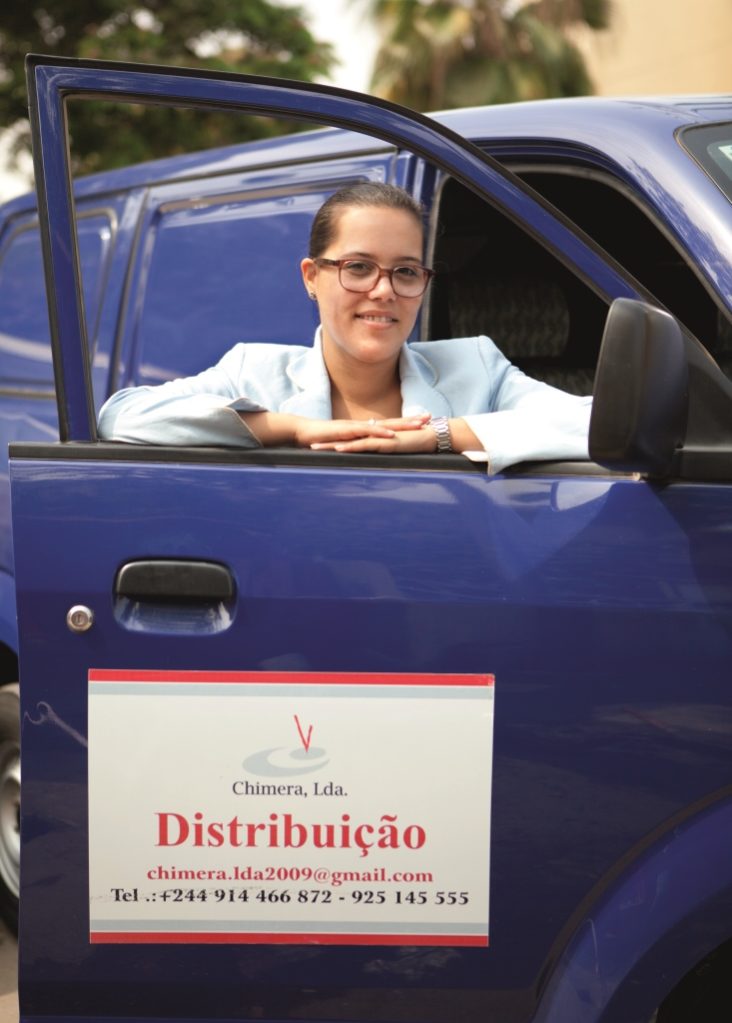At popular beach restaurant Coconuts on Ilha de Luanda (Island of Luanda), Soraia Neto arrives with her three-month-old child and her child minder. Instantly disarming with her pretty, youthful features and soft voice, she introduces her two companions. “They join me in the office every day,” she says, smiling.
As 29-year-old Neto sits down to a glass of lemonade, conversation turns to business. Neto set up food distribution company Chimera Lda and truck company V.D.G. Lda in 2009. She now distributes five food brands to various clients, including international marine fuel logistics company Pumangol and plans to expand into Angola’s provinces.
“My prices aren’t more competitive but I try to offer excellent service,” Neto explains when asked how her relationship with Pumangol blossomed this early in her entrepreneurial career.
“I work seven days a week if necessary.”
Neto set up her businesses upon her return to Angola, fresh from France’s Sorbonne University. Her family moved to France when she was four years old. From ages 12 to 15, she attended the French school in Luanda before moving back to Paris where she studied economics and international business. She concluded her third internship at Africa-oriented French brand representative Pierson Export, which asked her to continue working with them in Angola. Soon afterwards, she set up Chimera Lda.
Loading...
“For Angolans, all it takes to set up a business is three days, plus a minimum investment of $1,000. To speed up the process, you need shareholders. My brother is shareholder of V.D.G. Lda, my husband owns half of Chimera Lda. I’m hoping to build a group of companies in the future to spread my risks,” she says.
Neto invested $40,000 of her own money into her business and borrowed another $160,000.
“My annual turnover is $165,000, while annual profit is just $35,000 due to costs. Annual growth is 35%. I expect to be debt-free at the end of this year.”
Within three years, the number of products Neto sells has grown from one to five. She has eight employees. “This is why I returned to Angola. There are opportunities here that you’ll never get in Europe due to competition. If you’re intelligent, do things properly and have a few connections, you can grow fast here,” she says.
Angola’s food import industry is dominated by Lebanese and Indian importer-distributers, but competition is on the rise. Neto buys her products—McVitie’s biscuits; Grisbi biscuits; Suave toilet paper; Vanans pastries; Jota Food popcorn; Lays; Ruffles and Cheetos chips—from Lebanese importers Fratelli, AngoMex and IMT Trading. Suave, Vanans and Jota Food are Angolan brands.
“The Lebanese are the kings in the food market. No-one has managed to out-compete them. I love them, they truly understand African markets. I don’t import myself yet because of the big risks involved and the fact that you have to mobilize lots of money. I do want to import in the future. As an importer-distributer at the beginning of the distribution chain, you have more power and control over the market,” says Neto.
Neto has her eye on food products from the States.
“That’s dollars for dollars,” she explains. “The cost of euro products are very, very high. And with Chinese or Indian food products, you have to be physically present at the export site to control their quality.”
Neto’s goal is to own and distribute her own frozen food brand.
“I want to buy brandless cooked food in the US then design my own packaging in Angola. My brand name will be Comida da Sara, after my daughter.”
She estimates that it will take her up to two years to turn this dream into a reality.
“I’ve already got the place. It’s an old $400,000 soap factory on Samba road. But buying machines and refrigerators is a big investment. I have to make more money first.”
Neto aims to expand her food distribution network into Angola’s next frontier: its provinces, which are being made more accessible by the rapid rebuilding of Angola’s infrastructure after its 27-year civil war which ended in 2002.
“You can improve lives there with simple products. In Luanda, there is big competition,” she says. Neto already distributes products to MWA, a company that operates outside Luanda. Angola’s coastal provinces offer the best opportunities.
“Many people from the capital work in Lubango, Lobito and Huambo. They were very important during colonial times and are once again growing quickly,” says Neto.
Needless to say it is not all roses in Angola. “Many people here don’t have a professional conscience, even if you pay them a good salary. I’m trying to employ more people but can’t find them,” she says.
“Corruption is an element you have to integrate if you want to make millions and do big business, rather than a stumbling block,” she adds.
“I prefer not to because in African countries political contexts can change suddenly. I have connections with people in power, but prefer to remain independent and grow slowly but surely so that people don’t show up one day and say: ‘Hey, give back that money, it’s not yours’.”
According to Neto, being a woman is not an obstacle. “There are not many female entrepreneurs in Angola and the ones that do exist, are appreciated and respected by the other sex. As a woman, you have more power over men.”
Her femininity facilitated the start of her entrepreneurial adventure.
“It was easier to meet potential male clients and arrange meetings. They were more flexible, welcoming, talkative and less aggressive. The way you relate to people is the key to success in this business.” Neto prefers to work with men. “I think men are more serious,” she says. “Girls get pregnant and have too many responsibilities at home.”
Loading...
